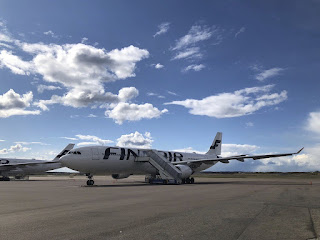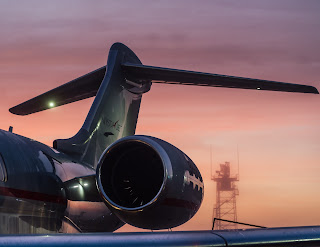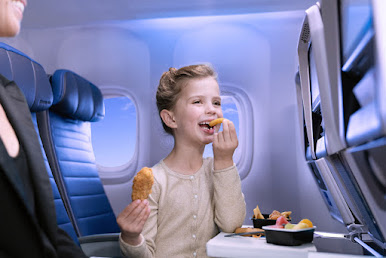The leading private aviation company redefines gastronomy in flight with expert scientific and artistic findings, signature seasonal menus and Michelin-starred partners
At a table at 45,000 feet — higher than Mount Everest — is probably the highest you will ever dine. This is the unique experience offered by VistaJet, the first and only global business aviation company, allowing passengers to embark on a curated voyage through the finest delicacies in the world — on board and at their destination.
Even the greatest gourmand has to reset their senses when flying as the effects of altitude, lower humidity and increased noise and movement will have an effect, from metabolism to how we perceive different tastes. In particular, cabin air reduces the aroma that, together with taste, makes flavour — up to 80% of what people think is taste is, in fact, smell. Flying private, of course, does help to minimize the impact on the senses. At 45,000 feet, a VistaJet Global 7500 aircraft has an equivalent air pressure of only 4,500 feet and a controlled humidity level. But still, a difference can be noticeable.
Done well, food nourishes the heart and soul, body and mind. Why, then, is it so often the forgotten factor in the air — a necessity rather than a pleasure? Factors in flight are no reason to compromise.
“We have been on a journey to transform the private dining experience in the air — to make it something to savour”, says Diego Sabino, Vice President of Private Dining at VistaJet. “Simple things, big flavours and the best ingredients prepared and cooked to perfection will always travel well. We have explored the art and science of dining, so our Members can cherish time together on board, with the right taste, whatever the occasion.”
To ensure every passenger savours every bite, VistaJet’s expert eye to inspire the palate include:
Signature Seasonal Menus
VistaJet is focused on seasonality, health and wellbeing, continually evolving its menus for all — whether travelling for business, with family and friends, or celebrating a milestone — no matter where they are flying from.
Perception of salt and sweetness reduces by 30%; while humidity in the home is typically around 45%, in an aircraft it can be 20% or less, desensitizing taste buds. That is why VistaJet works with more than 7,000 trusted suppliers around the world: the finest producers and purveyors to source the freshest and highest quality ingredients and dishes. Every dish is prepared for in-flight, high-altitude dining.
Renowned Partners
Even top chefs need to change the way they think about food that will be served on board a flight. Many of our award-winning partners have reformulated their iconic dishes and created exclusive meals to taste perfect in a VistaJet cabin.
Working with over 100 of the most sought-after private chefs and Michelin-starred restaurants for those special moments both in the sky and on the ground, our renowned Private World partners include a gateway to the most enlightening dishes — the revered Nobu Matsuhisa offering a new and exclusive dish onboard flights from the U.S.; Michelin-starred Alex Dilling from his eponymous restaurant at Hotel Café Royal in London; the inspired Nuhma Tuazon in New York; the delectable Tosca di Angelo at The Ritz Carlton in Hong Kong; the specialist Bon Soirée onboarding dishes from England; the legendary Zeffirino in Genoa, Italy; Chef Ivan Alvarez at the picturesque Ithaafushi — The Private Island, Maldives; the considered Origin Grill at the Shangri-La in Singapore; and a partnership with Taj Hotels around the world, including their Michelin-starred Chef Sriram of London’s Quilon, Varq at Taj Exotica Resort & Spa, The Palm Dubai, House of Ming at Taj Mahal Hotel New Delhi, Wasabi by Morimoto at Taj Mahal Palace Mumbai, and Thai Pavilion at the President, Mumbai.
The Little Book of Dining in the Sky
It is nearly impossible to recreate our favourite restaurant in the sky, and nor should we try — there are obvious limitations to space and cooking facilities, in addition to how food tastes, smells, looks and feels. But this is no reason to compromise.
The Little Book of Dining in the Sky explores the art and science behind eating well with VistaJet. Tasting notes, jet chef secrets, travel wellness, the jet kitchen and service suggestions for whomever you are dining with. The musings and expert advice are all aimed at helping you discover the pleasures of the table, at altitude.
The Process and Unparalleled Service
The story behind how food gets from the farm to fork in flight is one of attention to detail across the entire supply chain. It is impossible to recreate the environment of a world-class kitchen in the sky, but we aim to come as close as possible.
As soon as your flight is booked, VistaJet’s Private Dining team will propose bespoke menus for you to choose from.
Sourcing specific ingredients can take a full day, while up to six hours might be needed to take food from the kitchen to the aircraft. Menus are finalised at least 24 hours before departure to ensure sourcing and preparation standards.
The private chef or restaurant starts creating the dishes. At this point any allergies, intolerances or other dietary needs will have been checked several times.
Hot dishes are freshly prepared by hand and par-cooked. Ingredients are packed into over-ready containers, and then blast-chilled to lock in taste, texture and freshness.
The meals are couriered to the departure airport in refrigerated vehicles and loaded onto the jet around 90 minutes before departure. VistaJet flies from 1,900 airports in 187 countries — about 96% of the world.
In the air, the VistaJet Cabin Host will finish cooking the food before it is expertly presented and served to passengers. All VistaJet Cabin Hosts are trained by the British Butler Institute, certified up to Level 2 in wine and spirits training and are food-safety qualified. They have also received expert plating tutorials from chefs specializing in different cuisines.
The leading private aviation company redefines gastronomy in flight with expert scientific and artistic findings, signature seasonal menus and Michelin-starred partners























